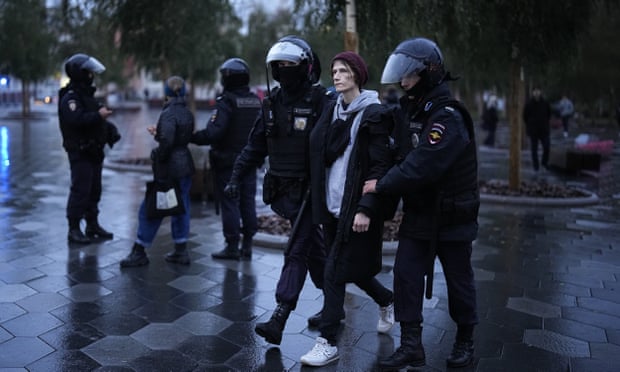
Live feed
From 1h ago
More than 2,000 people detained during protests in Russia, says human rights group
More than 2,000 people in total have been detained across Russia for protesting against President Vladimir Putin’s partial military mobilisation, including 798 people detained in 33 towns on Saturday, according to independent monitoring group OVD-Info.
Reuters reports that frustrations even spread to pro-Kremlin media, with one editor at the state-run RT news channel saying problems such as call-up papers being sent to the wrong men were “infuriating people”.
When Russia’s foreign minister, Sergei Lavrov, was asked on Saturday why so many Russians were leaving the country, he pointed to the right of freedom of movement.
Key events
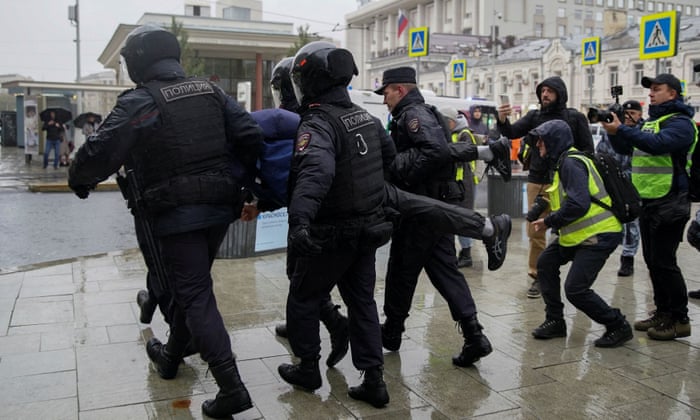
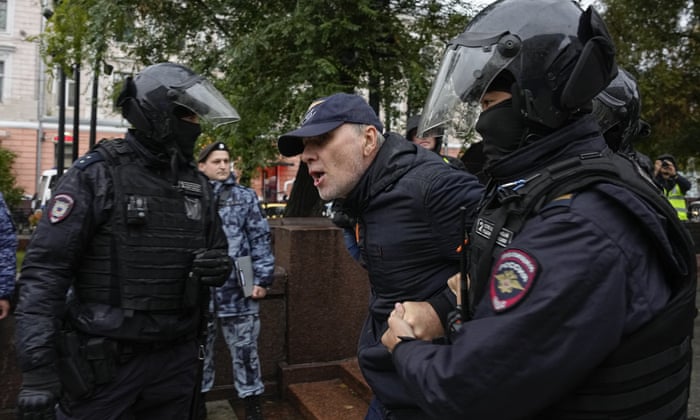
Putin allies concerned over mobilisation drive 'excesses'
Russia’s two most senior lawmakers have expressed concern at the way the mobilisation drive is unfolding in the country.
Valentina Matviyenko, the chairwoman of Russia’s upper house, the Federation Council, said she was aware of reports of men who should be ineligible for the draft being called up.
“Such excesses are absolutely unacceptable. And, I consider it absolutely right that they are triggering a sharp reaction in society,” she said in a post on the Telegram messaging app.
In a direct message to Russia’s regional governors – who she said had “full responsibility” for implementing the call-up – she wrote: “Ensure the implementation of partial mobilisation is carried out in full and absolute compliance with the outlined criteria. Without a single mistake.”
Vyacheslav Volodin, another Putin ally and speaker of the State Duma, Russia’s lower chamber, voiced his views in a separate post.
“Complaints are being received,” he said. “If a mistake is made, it is necessary to correct it ... Authorities at every level should understand their responsibilities.”
On that note, one of the five Britons released by Russia this week after being detained in Ukraine for months has given his first interview to the media.
Speaking to the Sun on Sunday, 28-year-old Aiden Aslin said he was stabbed while being kept in solitary confinement.
“I never thought I’d get out alive,” he told the paper.
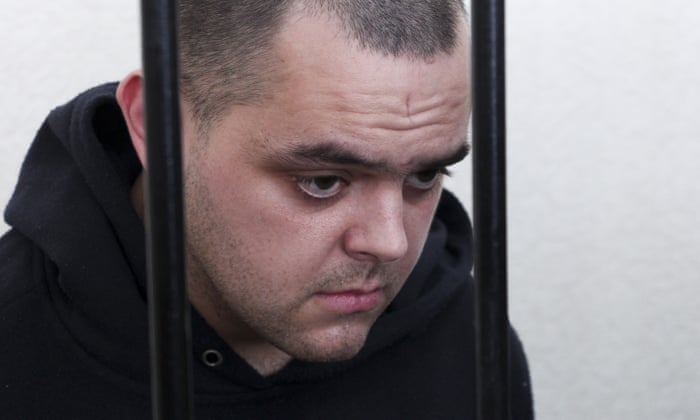
Aslin, from Nottinghamshire, described being “treated worse than a dog” after being captured in the south-eastern city of Mariupol.
He had been living in Ukraine for a number of years and was serving with its regular forces before the Russian invasion began.
After being stabbed in the back by an officer, Aslin said he was asked: “Do you want a quick death or a beautiful death?”
His captors also played the Russian national anthem on a loop, claimed Aslin, who said he was forced to stand and sing along or face being beaten.
Its role in securing freedom for foreign fighters in Ukraine may help Saudi Arabia rehabilitate its international reputation, analysts say.
It comes after Russia released 10 foreigners it had captured in Ukraine, including five Britons, to Saudi Arabia on Wednesday.
Saudi Arabia said its mediation effort had been led by crown prince Mohammed bin Salman, who has struggled to reinstate his reputation since the 2018 murder of journalist Jamal Khashoggi.
Kristin Ulrichsen, a political scientist at Rice University’s Bake Institute in the US, said the working relationship between Saudi Arabia and Russia appears to have been a crucial element in the choice of intermediary.
“By sanctioning this mediation and delivering results, Mohammed bin Salman is able to present himself as capable of playing the role of regional statesman in a way that counters the narrative of the crown prince as an impulsive and disruptive actor,” he added.
More than 2,000 people detained during protests in Russia, says human rights group
More than 2,000 people in total have been detained across Russia for protesting against President Vladimir Putin’s partial military mobilisation, including 798 people detained in 33 towns on Saturday, according to independent monitoring group OVD-Info.
Reuters reports that frustrations even spread to pro-Kremlin media, with one editor at the state-run RT news channel saying problems such as call-up papers being sent to the wrong men were “infuriating people”.
When Russia’s foreign minister, Sergei Lavrov, was asked on Saturday why so many Russians were leaving the country, he pointed to the right of freedom of movement.
A Moroccan prisoner of war released as part of an exchange between Moscow and Kyiv said he wanted to draw attention to the “struggle” of Ukraine as he returned home on Saturday.
Agence France-Presse reported the 21-year-old as saying:
I’m happy to come home after going through very difficult times.
I want to draw attention to the difficult situation in Ukraine and the struggle of its people in this painful time.
Brahim Saadoun, an aeronautical engineering student, had been based in Ukraine since 2019.
He was freed on Wednesday, one of 10 foreign prisoners of war – including five British and two American citizens – transferred to Saudi Arabia as part of the exchange between Moscow and Kyiv.
Smiling and appearing in good health alongside his mother, Saadoun thanked Saudi Arabia, the Turkish government and the Moroccan people “who stood in solidarity with us”.
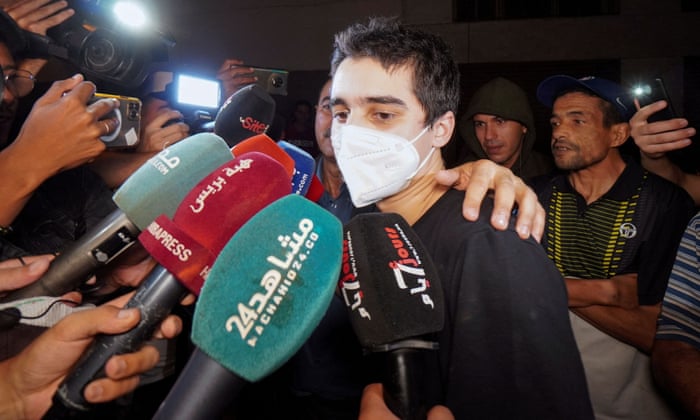
Any annexed territory will have Russia's ‘full protection’ – Lavrov
Russia’s foreign minister, Sergei Lavrov, says the four Ukraine regions where votes are under way in “referendums” will be under Moscow’s “full protection” if they are annexed by Russia.
At a news conference following his speech to the United Nations general assembly in New York, Lavrov was asked if Russia would have grounds for using nuclear weapons to defend annexed regions of Ukraine. He said Russian territory – including territory “further enshrined” in Russia’s constitution in the future – “is under the full protection of the state”.
“All of the laws, doctrines, concepts and strategies of the Russian Federation apply to all of its territory,” Reuters reported him as saying while also referring specifically to Russia’s doctrine on the use of nuclear weapons.
The Group of Seven industrialised economies have said they will not recognise the results of the “referendum” votes.

Shelling hits Ukraine south and east
Ukraine and Russia have traded blame for missile strikes and shelling in various parts of the south and east, Reuters reports.
Ukraine’s military said early on Sunday that Russian forces had launched dozens of missile attacks and air strikes on military and civilian targets, including 35 “settlements”, over the past 24 hours.
Russia denies targeting civilians. Its RIA state news agency, citing unidentified sources, said earlier that Ukrainian forces shelled a granary and fertiliser warehouses.
Reuters was unable to verify either side’s claims.
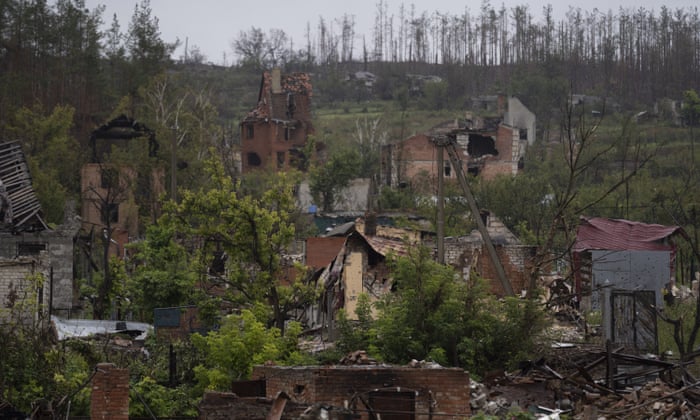
Summary
Hello and welcome back to the Guardian’s ongoing live coverage of the war in Ukraine. This is Adam Fulton and here are the latest developments to bring you up to speed as it approaches 9.15am in Kyiv.
More than 730 people were detained across Russia at the latest protests against the country’s mobilisation decree, a rights group said, three days after president Vladimir Putin ordered the country’s first military draft since the second world war. The independent OVD-Info protest monitoring group said it was aware of detentions in 32 cities, from St Petersburg to Siberia. Unsanctioned rallies are illegal under Russian law, which also forbids any activity considered to defame the armed forces.
A new law signed by Putin says Russian troops who refuse to fight, desert, disobey or surrender to the enemy could now face a jail sentence of up to 10 years, according to Russian media reports. The law was approved by the parliament during the week.
Russia’s deputy defence minister, Dmitry Bulgakov, has been dismissed from his post. Bulgakov, who has been in charge of military logistics since the beginning of the Ukraine invasion, has been replaced by Col Gen Mikhail Mizintsev, the head of the National Defence Management Centre, who oversaw Russia’s siege of Mariupol.
Russia’s foreign minister, Sergei Lavrov, addressed the UN general assembly on Saturday, casting opposition to Russia’s assault on its neighbour as limited to Washington and countries under its sway. “The official Russophobia in the west is unprecedented. Now the scope is grotesque,” Lavrov told the general assembly. He criticised the west for not engaging with Russia, saying: “We have never stepped away from maintaining contact.”
Lavrov, in a news conference following his speech to the assembly in New York, said the Ukrainian regions where votes were under way would be under Moscow’s “full protection” if they were annexed by Russia, including with nuclear weapons.
The so-called referendums are continuing in Luhansk, Donetsk, Kherson and Zaporizhzhia provinces, areas of Ukraine fully or partially occupied by Russian troops, with residents told to vote on proposals to declare independence and then join Russia. The polls are due to run until Tuesday.
China’s foreign minister says it supports all efforts conducive to the peaceful resolution of the “crisis” in Ukraine. Wang Yi told the United Nations general assembly on Saturday that the pressing priority was to facilitate talks for peace, Reuters reported.
Kyiv and Moscow traded blame for shelling in Ukraine’s Zaporizhzhia region on Saturday. The regional governor, Oleksandr Starukh, said on Telegram that Russian forces launched “a massive missile strike” on the region from about 10 planes, wounding at least three people. Russia’s RIA state news agency, citing unnamed sources, said Ukrainian forces shelled a granary and fertiliser warehouses in the region. Reuters was unable to verify either side’s claims.
Iran regrets Ukraine’s decision to downgrade diplomatic ties, its foreign ministry says. A statement said Iran’s ministry spokesperson, Nasser Kanaani, had “advised” Ukraine to “refrain from being influenced by third parties who seek to destroy relations between the two countries”. It came after Ukraine stripped Iran’s ambassador of his accreditation over what it called Tehran’s “unfriendly” decision to supply Russian forces with drones.
The queue at the border between Russia and Georgia is about 10km (six miles) long, where people have reportedly been waiting more than 20 hours to cross. The number of border crossings from Russia into Finland has doubled in recent days compared with last week.
Two civilians were killed in attacks in Ukraine’s Donetsk region on Friday and three were injured, according to Pavlo Kyrylenko, governor of the Donetsk oblast. Russian forces also shelled settlements near the Russian border. In the Kupyan district, five people were injured from shelling, including two children, aged 10 and 17.
Russian authorities in the occupied regions of Zaporizhzhia and Kherson have allegedly started handing out draft notices and mobilising men of conscription age who “renounced Ukrainian citizenship and received passports of the Russian federation”, according to Ukraine’s ministry of defence.
President Volodymyr Zelenskiy told Ukrainians in occupied territory to hide from Russian mobilisation, avoid conscription letters and get to Ukraine-held territory. However, if they ended up in the Russian military, Zelenskiy asked people to save their lives and help liberate Ukraine.
Russian forces are probably trying to attack dams in Ukraine in order to flood Ukrainian military crossing points amid Russian concerns about battlefield setbacks, the latest UK Ministry of Defence briefing said. The strikes were “unlikely to have caused significant disruption to Ukrainian operations due to the distance between the damaged dams and the combat areas”, it said.
With Reuters and Agence France-Presse

Russia-Ukraine war latest: what we know on day 214 of the invasion

Russia’s allies China and India call for negotiations to end Ukraine war
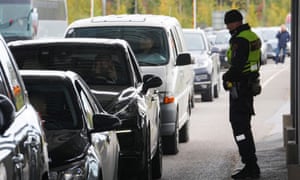
Border queues build as people flee Russia to escape Putin’s call-up

Expect dissent to rise as Putin’s call-up brings Ukraine war home to Russians

Vladimir Putin’s ship of fools is sinking fast. Will he take everyone down with him?
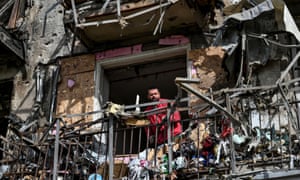
Missile strikes on Ukrainian cities as call-up causes chaos in Russia
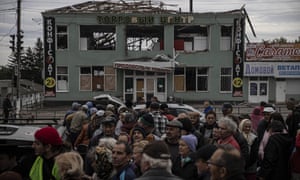
Russians occupying Kharkiv region demanded personal data in return for food
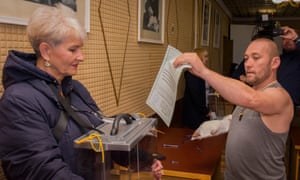
‘Why bother voting?’: apathy in Ukraine amid so-called referendums


